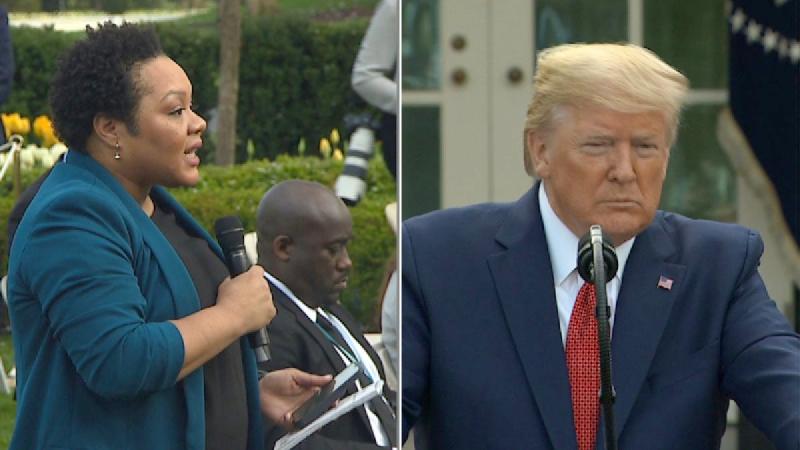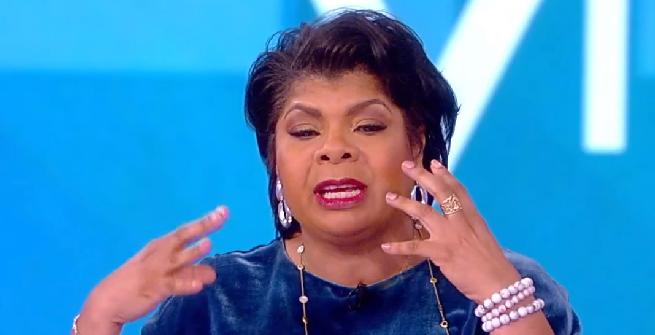In the latest episode of Spotify’s “Jemele Hill is Unbothered”, White House correspondents Yamiche Alcindor and April Ryan join Jemele to discuss what it’s like covering President Donald Trump, and the impact of their verbal confrontations with the president.
They also discuss how their career paths led them to the White House, and the significance of having black journalists represented in the presidential press corp, and how they expect tomorrow’s election to unfold. Plus, April, who has now covered four presidential administrations, compares and contrasts the different administrations.
Below are key moments and pull quotes from the episode. Please let me know if you can share this with your readers and happy to offer up select interviews with host Jemele Hill. You can find a link to cover art HERE.

Yamiche on Her First Memorable Moment Covering President Trump
YA (18:40): In November, 2018, I asked him whether or not he had anything to say about people thinking that he was emboldening white nationalists by calling himself a nationalist. And I remember him then calling my question racist. And I remember that being a moment where I recognized what it meant to be questioning the president in that way and for the president to kind of be lashing out at you and what that, what that would Intel. Um, so I remember that being the most memorable moment that I’ve ever been called on in a press conference.
(19:59): He was mad because a lot of it had to do with the fact that they had won so badly in the midterms. Democrats had retaken the house. So there was this feeling that he was already in this bad mood, um, pacing at times he had, he had got into it with Jim Acosta that day. So when you cover president Trump, especially you get to know his moods and get to know when things have really gotten into a place where he’s feeling bad and that press conference. I remember thinking to myself, I think that he’s really, really upset. I think that he’s, he’s, he’s, he’s stewing on the idea that he is now attached to these losses, um, that have to do with the house of representatives.
April Ryan: Yamiche is right, You watch a President’s body language. That’s a part of your reporting, his mood, what he says, how he delivers it. And that tells you because it tells you where his mind is. But with this presence a little different, well, no, it’s a LOT different than other presidents. I mean, this is just this president and how we cover it is so different. This presidency. And the way we cover is a polar opposite of the last three presidents that I’ve covered. It’s it’s, it’s two extremes.
On Handling Viral/Public Confrontations with Trump:
YA (23:46): Well, I remember in the moment feeling like my ancestors are carrying me through, because I remember being very focused, very solid. I didn’t flinch. I didn’t. I watched that video over and I thought, yeah, I did a good job. And I felt like I did a good job because I just stayed laser focused on the job and, and stayed professional. Um, and the way that I handle that is first by calling my mom and telling her, Hey, calm down, you’re going to see some news clips of me, the whole family from Haiti is going to be calling, asking what happened and just chill out a bit. Um, because I think my mom gets, and frankly, my family gets a little worried because when you go viral, it can be scary for people involved, um, meaning that you can end up with a lot of hate online.
Well, I remember in the moment feeling like my ancestors are carrying me through, because I remember being very focused, very solid. I didn’t flinch. I didn’t. I watched that video over and I thought, yeah, I did a good job. And I felt like I did a good job because I just stayed laser focused on the job and, and stay professional. Um, and the way that I handle that is first by calling my mom and telling her, Hey, calm down, you’re going to see some news clips of me, your, your families, the whole family from Haiti is going to be calling, asking what happened and just chill out a bit. Um, because I think my mom gets, and frankly, my family gets a little worried because when you go viral, it can be scary for people involved, um, meaning that you can end up with a lot of hate online.
A lot of Facebook hate a lot of Twitter hate, um, and people can get nervous, frankly. So I think that that’s the first thing that I do. The second thing that I do is I try my best, um, to focus on the work and to try to focus on, well, what is the next story I want to do? What’s the next thing that I want to do? How do I want to handle this? How do I continue to be professional at and acknowledge that people for the people who are supporting me without playing too much into this, because at the end of the day, when you’re a reporter, your job is to not be the story. So going viral can be really, I think, disconcerting and can be very, very, um, conflicting. If you’re a journalist, who’s just been so used to trying to be behind the scenes and trying not to be part of the story.
So even as an audio reporter, like, of course, you know, my face, you see my face, I’m delivering the news, but I never want to be well, here’s what happened to me today at the white house. And a couple of times, unfortunately, I’ve had to say, well, here’s what he said to me personally.

April Ryan: The sad piece about it is I’m just here to do a job. I didn’t sign up for this, but I’m here to do a job, but it’s not about me. It’s about the issue. It’s about the story. We are still a community with the highest numbers of negatives in almost every category. And before Yamiche came there before a lot of people came there, I was the only one asking a lot of those questions and that’s sad. And I’ll never forget. Joy Reid said April Ryan made asking questions about race in Vogue, because everybody’s now asking. And that’s the sad piece. But because of the history of me asking the questions about a community that they didn’t want to talk about raised there ire they attacked me. They went after me personally, when it was about the story that they didn’t like, but they wanted to go after me who is not from a larger network. Who didn’t have the infrastructure or, or the support system that they thought. They went after me in the worst kind of ways And the residue still lingers. And this is, this is something that I’m still dealing with emotionally, mentally, and physically. I had to move my physical home because of people not understanding civics, understanding this is the natural political back and forth reporters asking questions of a president, the accountability feats, the first amendment, you know, I’ve had the bomb squad at my home. I’ve had to have body guards. So a reporter in 2020 in the United States having to go through that, that’s not, that’s unheard of. And when Yamiche said she she called her mother.
But when you are standing in front of this president at the first press conference that he’s ever had, and you ask him about his urban agenda, and then he proceeds to tell you to get the meeting together with the congressional black caucus. And your daughter is in school, looking at current events and sees it in real time and text messages. Mommy, are you okay? I’m like, yes, baby I’m great. And I’m dying on the inside. I don’t know about Yamiche for those things happened to me. It’s like, I get it I get crazy fire on this. And I’m like, Oh my God, what’s going on now? I wasn’t prepared for this. I did not sign up for this. But at the end of the day, I stand on the shoulders of my late mother, my late father, my ancestors, my great great-grandfather Joseph [inaudible] Brown, who was sold on the auction block and Fayetteville, North Carolina, never knowing that his great, great grand will be standing in front of the president of the United States, asking questions about our people. So that’s, if there is any bright spot in it and if it advances the cause of our people. All right.
YA: So what I think is, I honestly think that being black is training ground for doing your job under duress. I think that for a long time, I didn’t realize it. But when you get through majority white elementary schools, you get through high schools where people don’t think that you’re going to make it a college you get through, I went to Georgetown and majority white schools where people say things about you that, you know, not to be true, where people make assumptions about you, that you know, aren’t true. And then you’re working in, in majority white newsrooms where people are at times surprised by your intellect or surprised, but you can write well or surprise that you can do your job. Well, you learn how to grin and smile and continue doing your job. And I think that for me, it’s felt like that it’s felt like this has been my entire life at the end of the day, I’m to do the work of the people.
I’m here thinking about my grandmother and my grandfather, who would, I don’t even know what they would think about the fact that I am questioning the president because they were born in a small village in Haiti and had no idea that we would even be able to come to this country, let along be on TV, let along be questioning presidents. So I think that, um, black people everywhere, when they walk up to me and say, how can you possibly put up with this? How can you possibly do your job under duress? I say, you’re probably doing your job under duress. You probably have a supervisor. Who’s told you something about yourself. That’s not true. You probably have somebody, a coworker who probably stole your, your, your ideas and then showed up to the meeting and thought and talked about them like they were theirs. There are so many different ways that African-Americans in particular are doing their jobs under duress are living in this country under duress, um, that we smile and we grin and we work it out and it’s tough, but I think it’s the way that we literally all are doing and surviving in this country.
On Being Singled Out by Conservative Media
AR: They have targeted me with stories. No, myth is not conjecture, It’s fact. I’ve had Tucker Carlson’s little paper or whatever it is target me. I’ve had Breitbart target me. I am a target. They consider me a character. I’m a human being, you know, who has a job as a stripping down journalist and an analyst who comes to it from what I have seen and understand. And my sourcing that is, is second to none over 23 years to, to bring to the story. But they can’t stand that I am not in line with what this president wants, and I’m never going to be in line with anybody. Look, Barack Obama, I was told when Barack Obama was president, someone said, um, one of his cabinet people said, yeah, you get, you get a pass from all the black presses. There’s one, that’s tough. And she’s fair. It was talking about me. I got along with every person, they understood that I was going to ask the issues, but for whatever reason, this president and this conservative media feels that I’m a problem, but I’ve taken it as a badge of honor.
On the Biggest Challenges for Biden/Harris
AR 46:52: You know, there are still Trump holdouts for whatever reason who don’t want Camila and who don’t want Joe Biden, they can, they can try to articulate it. But it’s about the fact that Donald Trump is the guy that they identify with. And that is the scary piece in politics. People want to feel like they can relate to the person. And politics is personal. Part of the reason why we have Donald Trump is because we had Barack Obama. This whole political system is broken. It’s been broken for a very long time and it’s
Broken because so many people feel that they’re not touched by government. That government does not see them. I am not seen by government. I am not heard by government. And Barack Obama won by hope and change. People knew black and white. All people knew that the system was broken, particularly as we were going into recession with George W. Bush, we were in this financially costly and physically costly war. And people said enough was enough, but then you see this black man that a lot of people still couldn’t wrap their head around, running the nation. So you go to a polar opposite. Donald Trump for Barack Obama, race and politics will always follow him. And then you had someone who brought another part of change for the forgotten man. The challenge for Joe Biden is to bring all people under this umbrella. And the question is those who particularly are angry about Barack Obama still, and they’re still calling his name.
How do you do that? When you have a black face on your ticket and you were mad, people were mad from the black face being the head of the ticket before and president. So I think his challenge is the Donald Trump mentality. Even if Donald Trump loses Trumpism and will still remain for a long time, it’s not going to be beaten down. It’s not going anywhere. And the question for me is how does Joe Biden handle that? How does he bring the forgotten man into this umbrella? They’re going to come begrudgingly. If they even come, how do you do that? That’s, that’s my thought for Joe. That’s his biggest challenge right now? It’s the mindset and the thought of Trumpism.
YA: I think there are twofold things. I think April really articulated that. Well, the first is I think can Joe Biden, um, really convinced people that the fear that president Trump has drummed into people all over this country, that that fear is unfounded. Because the president, um, as president Trump has really convinced a lot of Americans that Democrats are socialists, that there are people who want to take away their rights, that there are people who want to take away their neighborhoods, that they want to abolish the suburbs. There are people apart from the conspiracy theories about all sorts of things that are not true. Um, but there’s also the idea that there are people, especially, I will say, in some areas of this country, white people in particular, who are scared of diversity, who are scared of a changing country and it’s a country that is undoubtedly changing.
So how does Joe Biden convince some of those people, even if he wins, even if he wins in particular, of course, but also if he’s running, how does he convince those people to get on board and to not be afraid of what is going to be a changing America? The second thing I think that’s going to be a big challenge is the actual process of voting. There are so many people who are already trying to vote, who are already saying their vote is trying to be suppressed. Republicans based on the courts have learned how to, um, target people with surgical African-Americans in particular with surgical precision one judge said in North Carolina, so Republicans are better at suppressing the vote and that’s not, I don’t think that’s an opinion. I think that’s objective really true that Republicans have had the issues. They are the ones who have had the issues with redistricting with, with targeting people.
So there are polling places that are closing. People are going to be mailing voting at record numbers. This year, the president is the one who is controlling it. President Trump has one in control of the post office service. So I think that there’s a real issue there when it comes to can people vote fairly and can Joe Biden through whatever levers he can pull, can he make it so that he is allowing the people who are supporting him to feel confident in the vote and to show up if they can’t vote in by mail to show up in person in the middle of a pandemic. So I think that that’s going to be a big issue. Come the election day is whether or not people felt like they could fairly vote.
AR: Well, I can tell you this, for Joe Biden right now, and these rights groups, litigation groups, and rights groups are now working feverishly in case of a challenge because we know, I mean, just from what we’re seeing, I mean, I’ve never seen anything like this. This is 1960, 2020 version. You know, people are putting fake ballot boxes in California in black communities. And what you have to do is you have to be an advocate for your ballot to make sure your ballot is where it’s supposed to be. Because, and then the post office who would have thought that the, that the post office, the US postal office, where we send granny her Christmas card, or we get out little gifts from, for Christmas gifts or whatever – that are now the piece that is causing the problem, they have stolen the mailboxes off the corners and broken up the sorting machines. This is ridiculous. But at the end of the day, let’s watch how Joe Biden handles this because we understand he has got a power pack group of litigants, um, as well as civil rights organizations that are ready at the ready to fight for this because we are, it does it’s it’s, let’s just call it what it is. It’s not fair now. And then when it happens on election day, let’s see what happens because I got a feeling this is not over by any stretch of the imagination.
On Trump Accepting Election Results
YA (53:04) Well, the, I mean, the President has been clear that he feels like if he does it win reelection that the election is rigged. And he’s been very clear that he wants to put a Supreme court justice on the Supreme court to rule in his favor, if there is an election challenge. So president Trump is thinking of the Supreme court as his backup plan. Again, objective, not just opinion. So in some ways it’s going to be interesting to see what happens on election day and the days and possibly weeks and months after you expect a challenge.
Jemele Do you guys expect a challenge? Even if it is a blowout.
YA: I think that the president, president Trump, if it’s a blowout and there’s nothing to challenge and he can’t physically ask for a recount, then, then Republicans probably will not say we need to get a recount anyways, even if it’s not, um, even if it’s not something that can statistically actually happen, but who knows? I mean, I think Republicans, the line they have drawn and including Mitch McConnell has been this peaceful transfer of power. When the president said that he wouldn’t commit to one Mitch McConnell and a host of other Republicans said, actually, that’s the way America works. We can back the president, all sorts of other things. But when it comes to a peaceful transfer of power, we expect that to happen no matter who wins
AR: Jemele, I love Yamiche. She’s so cerebral. Let me tell you something. This is a [inaudible] reality show Yamich, come on! Now I gotta help you understand this man is not logical. He has already said that he is going to watch. And if he doesn’t like it, guess what he’s going to do? He’s going to white knuckle, no orange knuckle, the resolute desk. But let me say this on January 20th, when there is a split screen of Joe Biden taking the oath of office and the troops going in, or whatever happens on the other side data, because Donald Trump is not going to go to the oath, you know, that to the swearing in ceremony, you know that let’s, let’s call that right there. Um, but what’s going to happen is, is that because I’m already, I’m already producing this picture because I believe it’s going to happen this movie.
Um, I just see it. I see it. Cause we know this man. He’s very theatrical. So what’s gonna happen is he’s not gonna leave. I talked
source:
Paul Yadgir
[email protected]
We Publish News 24/7. Don’t Miss A Story. Click HERE to SUBSCRIBE to Our Newsletter Now!





